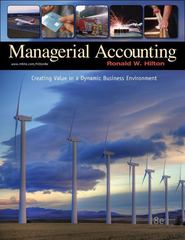Question
please any suggestion The FASB has recently issued twoexposure drafts concerning materiality. What changes to the auditor's current view of materiality will occur if these
please any suggestion
- The FASB has recently issued twoexposure drafts concerning materiality. What changes to the auditor's current view of materiality will occur if these exposure drafts are adopted
How should materiality be applied FASB weighs in
By Ken Tysiac
September 24, 2015
See more at: http://www.journalofaccountancy.com/news/2015/
FASB issued two exposure drafts Thursday that address the use of materialityan attempt to help organizations eliminate unnecessary disclosures in financial statements.
Feedback received by FASB indicated that the current discussion of materiality in the board's conceptual framework is inconsistent with the legal concept of materiality established by the U.S. Supreme Court, FASB Chairman Russell Golden said in a news release.
That created uncertainty about organizations' abilities to interpret which disclosures are material, as well as FASB's ability to identify and evaluate disclosure requirements in accounting standards, according to Golden.
The proposals are part of the disclosure framework project FASB is undertaking to improve the effectiveness of disclosures in notes to financial statements. The proposals address the use of materiality in two ways:
- Helping organizations use discretion when determining which disclosures in notes to financial statements should be considered "material," and
- Helping FASB understand the reporting environment in which it sets accounting and reporting standards.
One of the exposure drafts issued Thursdayproposesamendments to Chapter 3 of FASB Concepts Statement No. 8, Conceptual Framework for Financial Reporting, and is intended to clarify the concept of materiality.
The other exposure draft, Proposed Accounting StandardsUpdate,Notes to Financial Statements (Topic 235): Assessing Whether Disclosures Are Material, aims to promote the appropriate use of discretion when organizations decide which disclosures they should consider material. The amendments to ASC Topic 235 would apply to all types of organizationspublic and private companies, not-for-profits, and employee benefit plans.
In a 2012comment letterreplying to a FASB discussion paper, James G. Campbell, Intel's vice president for finance and corporate controller, wrote that disclosure effectiveness requires application of materiality. The letter said the appropriate threshold for materiality is consistent with the Supreme Court's interpretation of materiality, and that FASB Concepts Statement No. 8's discussion of materiality can lead organizations to a threshold that is too low and exacerbates disclosure overload.
"Materiality assessments for disclosures are not occurring as often as they should," the letter said.
A 2012comment letterfrom the American Gas Association encouraged FASB to clearly define materiality and relevance with a focus on limiting disclosures in financial statement notes.
"Unless the Board enhances the materiality and relevance guidance, reporting entities may choose to avoid being challenged by independent auditors, legal advisers, and regulators by not making any changes to their notes or even including immaterial disclosures," wrote Stephen P. Feltz, chairman of the American Gas Association Accounting Advisory Council.
FASB's proposals would:
- Make it clear that FASB does not define materiality.
- Delete the existing discussion of materiality in Chapter 3 of FASB Concepts Statement No. 8 and replace it with a broad observance of the Supreme Court's definition of materiality.
- State that materiality is applied to quantitative and qualitative disclosures individually and in the aggregate in the context of the financial statements taken as a whole. Therefore, some, all, or none of the requirements in a disclosure may be material.
- Refer to materiality as a legal concept.
- State that an omission of immaterial information is not an accounting error.
- See more at: http://www.journalofaccountancy.com/news/2015/sep/fasb-proposal-what-materiality-means-201513079.html#sthash.4cmGQT5C.dpuf
The FASB exposure drafts issued on September 24, 2015 would affect an auditor's view of materiality in multiple ways if adopted. Currently, FASB's conceptual framework for materiality is viewed by many as providing an unclear interpretation of which disclosures are material creating a disclosure overload. This perception is reinforced with FASB's inconsistency with the U.S. Supreme Court's determination of materiality. FASB Chairman Russell Golden stated that "these proposals are intended to clarify materialitywhich will help organizations improve the effectiveness of their disclosures by omitting immaterial information, and focus communication with users on the material, relevant items."
The two exposure drafts propose amendments to Chapter 3 of FASB Concepts Statement No. 8, Conceptual Framework for Financial Reporting, and provide an update for Notes to Financial Statements (Topic 235): Assessing Whether Disclosures Are Material. These drafts are intended to clarify that FASB does not define materiality, as it is a legal concept defined by the Supreme Court. And to promote an organizations proper use of discretion when determining whether some, all, or none of the information in the disclosures should be considered material.
Step by Step Solution
There are 3 Steps involved in it
Step: 1

Get Instant Access to Expert-Tailored Solutions
See step-by-step solutions with expert insights and AI powered tools for academic success
Step: 2

Step: 3

Ace Your Homework with AI
Get the answers you need in no time with our AI-driven, step-by-step assistance
Get Started


